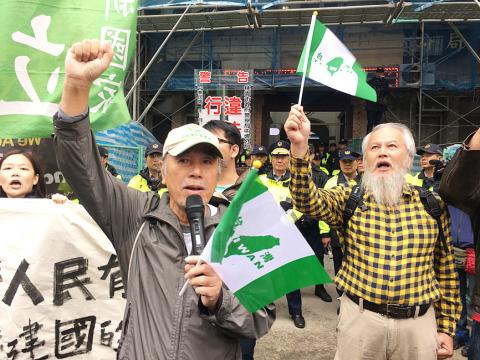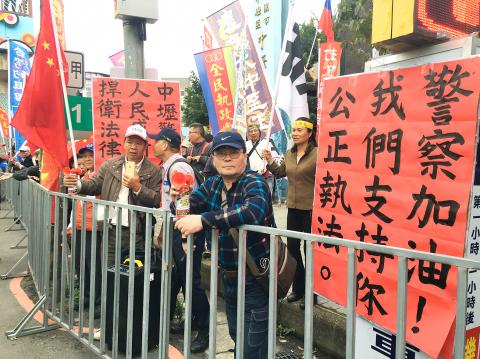Several civic groups and pro-independence organizations yesterday gathered outside a police station in Taoyuan to mark the 40th anniversary of the Jhongli Incident (中壢事件), which is considered a watershed event in Taiwan’s democracy movement.
The groups gathered in front of the Jhongli Police Station in Taoyuan’s Jhongli District (中壢), waving Taiwanese “national flags” and shouting slogans such as “Unite for Taiwan,” “All hail Taiwanese independence” and “Fight for democracy, justice and human rights.”
Event organizers included Free Taiwan Party Chairman Tsay Ting-kuei (蔡丁貴) and Taiwan Independence Reformation Association director Lai Fang-cheng (賴芳徵).

Photo: CNA
“We must not forget what happened at this police station. It was a painful period in history, when Taiwanese were under the brutal dictatorship of the Chinese Nationalist Party [KMT] regime with its reign of terror and police-state tactics,” Tsay said.
The Jhongli Incident refers to a mass demonstration in 1977 in then-Taoyuan County’s Jhongli against alleged ballot-rigging in the Taoyuan County commissioner election in which former DPP chairman Hsu Hsin-liang (許信良) was a candidate.
“It has been four decades, but unfortunately we Taiwanese still do not have our own nation. Why are we still being ruled by the KMT’s fraudulent ‘Republic of China’ state structure? Why do police still conduct their duties with the KMT’s martial law mentality, working to suppress Taiwanese’s aspirations for freedom?” Lai said.

Photo: CNA
Members of the Alliance of Referendum for Taiwan, Taiwan Independence Party and Taiwan Nation-Building Big Banner Squadron also participated in the rally outside the station, which was closed down for renovations.
The groups later headed to Jhongli Arts Hall (中壢藝術館) to take part in a special exhibition and academic conference, where researchers joined political figures for presentations on the historic significance and ramifications of the event.
Taoyuan Mayor Cheng Wen-tsan (鄭文燦) addressed the conference, promising to launch a plan to build a museum dedicated to preserve the memory of the incident.
“It was the first time Taiwanese stood up with courage and challenged the KMT’s oppressive rule. Because they wanted free elections and democracy, the people overcame their fear and gathered to stand up against the transgressions of the state apparatus,” Cheng said.
“The incident was a watershed moment for Taiwan’s democracy movement, where opposition to the KMT started to become better organized, to engage the public more effectively and to collaborate on election campaigns,” Cheng added.

Japanese footwear brand Onitsuka Tiger today issued a public apology and said it has suspended an employee amid allegations that the staff member discriminated against a Vietnamese customer at its Taipei 101 store. Posting on the social media platform Threads yesterday, a user said that an employee at the store said that “those shoes are very expensive” when her friend, who is a migrant worker from Vietnam, asked for assistance. The employee then ignored her until she asked again, to which she replied: "We don't have a size 37." The post had amassed nearly 26,000 likes and 916 comments as of this

US President Donald Trump said "it’s up to" Chinese President Xi Jinping (習近平) what China does on Taiwan, but that he would be "very unhappy" with a change in the "status quo," the New York Times said in an interview published yesterday. Xi "considers it to be a part of China, and that’s up to him what he’s going to be doing," Trump told the newspaper on Wednesday. "But I’ve expressed to him that I would be very unhappy if he did that, and I don’t think he’ll do that," he added. "I hope he doesn’t do that." Trump made the comments in

Tourism in Kenting fell to a historic low for the second consecutive year last year, impacting hotels and other local businesses that rely on a steady stream of domestic tourists, the latest data showed. A total of 2.139 million tourists visited Kenting last year, down slightly from 2.14 million in 2024, the data showed. The number of tourists who visited the national park on the Hengchun Peninsula peaked in 2015 at 8.37 million people. That number has been below 2.2 million for two years, although there was a spike in October last year due to multiple long weekends. The occupancy rate for hotels

A cold surge advisory was today issued for 18 cities and counties across Taiwan, with temperatures of below 10°C forecast during the day and into tonight, the Central Weather Administration (CWA) said. New Taipei City, Taipei, Taoyuan and Hsinchu, Miaoli and Yilan counties are expected to experience sustained temperatures of 10°C or lower, the CWA said. Temperatures are likely to temporarily drop below 10°C in most other areas, except Taitung, Pingtung, Penghu and Lienchiang (Matsu) counties, CWA data showed. The cold weather is being caused by a strong continental cold air mass, combined with radiative cooling, a process in which heat escapes from